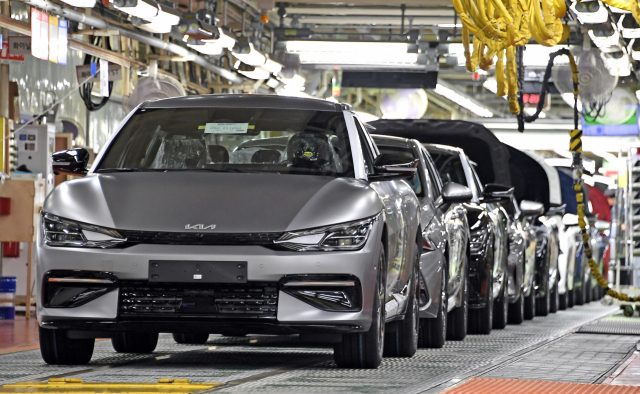 |
EV6 vehicles are assembled at Kia Auto Land in Hwaseong, Gyeonggi Province. (Kia) |
South Korea’s automotive production is expected to suffer a modest decline next year despite growing global car sales, an industry report said Monday.
Some 85.3 million cars are projected to be sold globally next year, a 4.7 percent increase compared to this year’s estimated 81.5 million units, according to the report by the Korea Automotive Technology Institute.
The report said the stable supply of automotive semiconductors is driving up car sales overall, despite lingering fears over interest rate hikes and economic uncertainties.
Unlike the upbeat global forecast, South Korea’s automotive sales will inch down by 0.5 percent next year to 1.66 million units, with exports slowing to a 4.2 percent decline to 2.1 million cars.
Korean automakers will feel the pinch from the US' Inflation Reduction Act, signed in August, which scraps generous tax incentives for electric vehicles assembled outside America, the report added.
South Korea’s Hyundai Motor Group -- the world’s third-largest carmaker -- operates extensive production facilities in the US but all EVs are exported from its home turf. The auto giant is ramping up efforts to build a new production base there that is expected to start operations from 2025.
Over the reduced domestic sales and export volume, the nation’s car production will also drop by 3 percent to 3.49 million units.
“While car sales in the US and Europe are expected to slow down next year, those in China, backed by aggressive government incentives, will continue their momentum,” the report said.
“Economic situations in the key markets can affect the sales of smaller cars whose buyers are more susceptible to economic sentiment.”
Global car sales are forecast to reach its peak in 2025 at an estimated 97 million units after chip shortages are mostly eased by 2024, the report said. EV sales are also expected to peak by 2025, it added.
Global demand for EVs are expected to reach 9 million units this year and expand to 12 million units next year. By 2025, some 20 million EVs will be released to the market.
The IRA offers up to $7,500 in tax credits to buyers of EVs assembled in North America only. Concerns are being raised that Hyundai Motor and Kia may lose competitiveness in the fast-growing US EV market.
South Korea has demanded a grace period for Korea-made EVs. Talks between the two countries through diverse diplomatic channels are ongoing.







